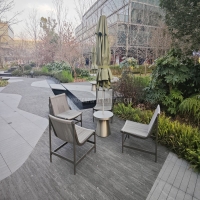Welcome to the website for landscape facilities products and knowledge.
How does the bin’s design prevent the waste from freezing solid in winter?
Freezing temperatures can turn waste into a solid, unmanageable block, making bin emptying a frustrating chore. However, modern bin designs incorporate several clever features to combat this winter nuisance.
1. Insulated Walls – Many cold-weather bins use double-walled construction with air gaps or foam insulation to slow heat transfer, keeping waste slightly warmer than the outside temperature.
2. Sloped Bottoms & Smooth Interiors – Angled bases prevent liquid accumulation, while slick inner surfaces make frozen waste easier to dislodge when tipped.
3. Thermal-Absorbent Materials – Some bins use dark-colored plastics or metals that absorb sunlight during the day, radiating minimal warmth to delay freezing overnight.
4. Ventilation Systems – Strategically placed vents reduce moisture buildup, minimizing ice formation from trapped humidity.
5. Flexible Liners & Removable Inserts – Detachable inner containers allow users to break free frozen waste more easily, while reinforced liners resist cracking in cold conditions.
By combining these elements, winter-ready bins ensure waste remains manageable even in subzero temperatures, simplifying disposal and reducing maintenance headaches. Municipalities in snowy regions increasingly adopt such designs to maintain efficient waste collection year-round.
Related search:

Recommendation
Metal structure rattan chair without armrests for single person, with woven seat and backrest.